英语听力材料及答案
高中英语听力训练材料及答案

高中英语听力训练材料及答案高中英语听力是大家比较头疼的一个事,因为听力阅读语速特别快,根本就听不懂,而且由于词汇量积累的少,有时候还没等反应过来就读完了,所以根本就做不出题目来。
英语听力只能靠练,没有其他的办法。
下面是高中英语听力训练材料及答案,供参考。
1. What does the woman mean?A. She lost her notes.B. The notes are not hers.C. Someone has borrowed her notes.2. What do we learn about Monica?A. Her English is very good.B. She speaks English quickly.C. Her spoken English is still not so good.3. What does the woman suggest?A. Writing fewer papers.B. Quitting two other classes.C. Dropping one course.4. How many lessons must the man review at the weekend?A. 3.B. 12.C. 15.5. What does the woman think of learning English?A. It is troublesome and wasting time.B. It is valuable.C. It is easy to learn.答案:CCCAB听下面5段对话,每段对话后有一个小题,从题中所给的A、B、C三个选项中选出最佳选项,并标在试卷的相应位置。
听完每段对话后,你都有10秒钟的时间来回答有关小题和阅读下一小题。
每段对话仅读一遍。
1.What does the woman think of cloning?A.It has no side effect at all.B.It sh ould be strictly forbidden.C.It may cause trouble for h umans.2.What’s the possible relationship between the two speakers?A.Friends.B.Husband and wife.C.Teacher and student.3.What do they hope to do?A.Stop cigarette production.B.Advise peop le not to smoke.C.Stop young people smoking.4.What teacher are they talking about?A.Their Chinese teacher.B.Their history teacher.C.Their politics teacher.5.What does the man think the weather will be like in April?A.Cool.B.Hot.C.Windy.答案:CAABB听第1段材料,回答第6、7题。
《英语听力教程3》答案与听力材料--高等教育出版社(张民伦)

《英语听力教程3》答案与听力材料UNIT 1Part I Getting readyA.B. Keys:1: burning of the forests/tree removal (deforestation)/reduction of the world's rain forests2: global warming/greenhouse effect/emissions of CO2Part II The Earth at risk (I)A. Keys:1.a. More people--------→more firewood----→fewer treesb. More domestic animals------→more plants-----→fewer available plantsa, b--→More desert----→move south-----→desrtt expanding south----→no grass2. Growing crops stabilize soil, without them the top soil just blows away. But if there isn't enough rain the crops don't grow.3. People try to grow food to support themselves or to create ranches where cattle can be raised, or to get hardwood for export, or to make way for an iron ore mineB. Keys:1: Sahara Desert2: North America & most of Europe3: top soil blowing away4: tropical forests destruction5: animal/plant species becoming extinct6: climate change for the whole worldPart III The Earth at risk (II)A. Keys:1: Trees would hold rainfall in their roots. When forests in the higher up-river have been destroyed, all the rain that falls in the monsoon season flows straight into the river and starts the flooding.2: He implies that some national governments just consider the results of their policies in the near future, or just think as far ahead as the next election.B. Keys:1: flooding in Bangladesh2: Action to be taken3: population controlPart IV More about the topic: The Effects of Global WarmingKeys:1: Warming up of the world2: Effects of global3: reduced potential for food production4: change of patterns of hear-related food poisoning, etc.Part V Do you know…?A. Keys:1: F 2: F 3: F 4: F 5: TB. Keys:Dos 1: your towels 2: Cut out 3: a wall-fire 4: fridge 5: wait until you've a full load 6: a complete mealDon’ts 7: iron everything 8: the iron up 9: the kettle 10: to the brim11: hot foodTape scriptPart I Getting readyA.B.1.The Amazon forests are disappearing because of increased burning and tree removal. In September, satellite pictures showed more than 20000 fires burning in the Amazon. Experts say most of these fires were set by farmers. The farmers were attempting to clear land to grow crops. The World Wildlife Fund says another serious problem is that too many trees in the Amazon rain forest are being cut down. The World Wildlife Fund says the fires show the need for urgent international action to protect the world's rain forests. The group warns that without such action some forests could be lost forever.2. Environmental issues swell to the full in Berlin this week, for the UN spongsored conference on global warming and climate change is the first such meeting since the Rio summit three years ago. With scientists and governments now generally ready to accept that the earth climate is being affected by emissions of CO2 and other greenhouse gases, over a hundred countries are sending delegations. But how much progress has been made implementing the greenhouse gas reduction target agreed on at Rio? Simon Dary reports...Part II The Earth at risk (I)A.I (Interviewer): Brian Cowles is the producer of a new series of documentaries called "The Earth at Risk" which can be seen on Channel 4 later this month. Each program deals with a different continent, doesn't it, Brian?B (Brian Cowles): That's right. We went to America, both North and South and then we went over to Africa and South-East Asia.I: And what did you find in each of these continents?B: Starting with Africa, our film shows the impact of the population on the environment. Generally speaking, this has caused the Sahara Desert to expand. It's a bit of a vicious circle we find. People cut down trees for firewood and their domestic animals eat all the available plants —and so consequently they have to move south as the Sahara Desert expands further south. I mean, soon the whole of Mali will become a desert. And in East Africa: here the grasslands are supporting too many animals and the result is, of course, there's no grass —nothing for theanimals to eat.I: I see. And the next film deals with North America?B: That's right. In the USA, as you know, intensive agriculture requires a plentiful supply of rain for these crops to grow, I mean if there isn't enough rain the crops don't grow. And growing crops stabilize soil, without them the top soil just blows away. This is also true for any region that is intensely farmed — most of Europe, for example.I: And what did you find in South America?B: In South America (as in Central Africa and Southern Asia) tropical forests are being cut down at an alarming rate. This is done so that people can support themselves by growing food or to create ranches where cattle can be raised to be exported to Europe or America as tinned meat. The problem is that the soil is so poor that only a couple of harvests are possible before this very thin soil becomes exhausted. And it can't be fed with fertilizers like agricultural land in Europe. For example, in Brazil in 1982 an area of jungle the size of Britain and France combined was destroyed to make way for an iron ore mine. Huge numbers of trees are being cut down for exports as hardwood to Japan, Europe, USA to make things like luxury furniture. These forests can't be replaced — the forest soil is thin and unproductive and in just a few years, a jungle has become a waste land. Tropical forests contain rare plants (which we can use for medicines, for example) and animals —one animal or plant species becomes extinct every half hour. These forest trees also have worldwide effects. You know, they convert carbon dioxide into oxygen. The consequence of destroying forests is not only that the climate of that region changes (because there is less rainfall) but this change affects the whole world. I mean, over half the world's rain forest has been cut down this century.Part III The Earth at risk (II)A.I: So, Brian, would you agree that what we generally think of as natural disasters are in fact man-made?B: Yes, by and large. I mean, obviously not hurricanes or earthquakes, but take flooding, for example. Practically every year, the whole of Bangladesh is flooded and this is getting worse. You know, the cause is that forests have been cut down up in Nepal and India, I mean higher up-river in the Himalayas. Trees would hold rainfall in their roots, but if they've been cut down all the rain that falls in the monsoon season flows sraight into the river Ganges and floods the whole country. The reason for flooding in Sudan is the same — the forests higher up the Blue Nile in Ethiopia have been destroyed too.I: Well, this all sounds terribly depressing. Um ... What is to be done? I mean, can anything be done, in fact?B: Yes, of course it can. First, the national governments have to be forward-looking and consider the results of their policies in ten or twenty years, not just think as far ahead as the next election. Somehow, all the countries in the world have to work together on an international basis. Secondly, the population has to be controlled in some way: there are too many people trying to live off too little land. Thirdly, we don't need tropical hardwood to make our furniture — it's a luxury people in the West must do without. Softwoods are just as good, less expensive and can be produced on environment-friendly "tree farms", where trees are replaced at the same ratethat they are cut down.I: And, presumably, education is important as well. People must be educated to realize the consequences of their actions?B: Yes, of course.I: Well, thank you, BrianB.I: So, Brian, would you agree that what we generally think of as ... er... as er ... natural disasters are in fact man-made?B: Yes, by and large ... er ... I mean, obviously not hurricanes or earthquakes, but take flooding, for example. I mean, practically every year, the whole of Bangladesh is flooded and this is getting worse. You know, the cause is that forests have been cut down up in Nepal and India ... I mean ... higher up-river in the Himalayas. Trees ...er ... would hold rainfall in their roots, but if they've been cut down all the rain that falls in the monsoon season flows straight into the river Ganges and floods the whole country. The reason for flooding in Sudan is the same — the forests higher up the Blue Nile in Ethiopia have been destroyed too.I: Well, this all sounds terribly depressing. Um ... what is to be done? I mean, can anything be done, in fact?B: Yes, of course it can ... er ... first, the national governments have to be forward-looking and consider the results of their policies in ten or twenty years, not just think as far ahead as the next election. Somehow, all the countries in the world have to work together on an international basis. Secondly, the population has to be controlled in some way: there are too many people trying to live off too little land. Thirdly, we don't need tropical hardwood to make our furniture — it's a luxury people in the West must do without. Softwoods are just as good, less expensive and can be produced on environment-friendly "tree farms", where trees are replaced at the same rate that they are cut down.I: And, presumably, education is important as well. People must be educated to realize the consequences ... um ... of their actions?B: Yes, yes of course.I: Well, thank you, Brian.Part IV More about the topic: The Effects of Global WarmingThe world is warming up. We know this because average temperatures are the highest since scientists started measuring them 600 years ago. The increase is about 0.2℃every year. This may seem very slight, but we know that slight changes in temperature can have a big effect on other things. Most scientists now believe this global warming is due to human activity.Jeff Jenkins is head of Britain's Climate Prediction Center. He explains how global warming can happen."Sunlight strikes the earth and warms it up. At the same time heat leaves the earth, but part of that is trapped by carbon dioxide and other gases in the earth's atmosphere. That has been happening ever since the earth was formed. But the fear is that increasing amounts of carbon dioxide produced by industrial processes and transport and so on will lead to a greater warming of the earth's surface. So that's the golbal warming that people are concerned about."People are most concerned about the use of fossil fuels. Fossil fuels are oil, coal, wood and so on. When these burn, they produce the gas carbon dioxide. Many scientists agree that an increase inthe amount of carbon dioxide and some of the gases in the atmosphere will increase the amount of warming. Computers are being used to predict what this may mean. They showed that there could be great changes in rainfall and the rise in the sea level as ice caps in the north and south poles melt. This could have a serious effect on agriculture according to Prof. Martin Perry of University College in London. He says it could become more difficult to grow food in the tropics at lower latitudes nearer to the equator."The most clear pattern emerging is the possibility of reduced potential production in lower latitude regions, and most generally speaking, increased potential in higher latitude regions. Lower latitude regions are already warm, to put it extremely simply, and plants there are quite near their limits of heat and drought stress. An increase in temperature or reduction in moisture would place limits on crop growth."Woman: Global warming could reduce food production in lower latitude regions. Lower latitude regions are already warm. Global warming could put more stress on plans and place limits on crop growth.Food production is only one area that could be affected. There could also be health and social problems. Prof. Antony MacMichael of the London School of Hygiene and Tropical Medicine believes that some rural areas are already suffering. And the insects and bacteria could spread disease more easily."Already a number of rural populations around the world are suffering from the decline of agricultural systems. Climate change would add to this. And we would expect that it would accelerate the flood of environmental refugees around the world. But it includes not just the food production systems, but the patterns of distribution of insects and infective agents around the world. It includes likely effects on patterns of hear-related food poisoning, water contamination and diarrhea diseases, lots of things like this that would respond sensitively to changes in climate."Woman: Global warming could affect the distribution of insects. Global warming could change patterns of heat-related food poisoning.Many countries now agree that something must be done to reduce the danger of global warming. But a worldwide agreement on lowering the production of carbon dioxide has been difficult to reach. This is because many economies depend on fossil fuels like oil. Scientists believe it's now the politicians in every region of the world who need to take action.Part V Do you know…?Environment has taken rather a back seat politically since the Earth summit in Rio de Janeiro nearly 5 years ago. But the problems that meeting highlighted had not gone away. One environmental think tank — the International Food Policy Research Institute — has been looking at the future of water and its report reflects growing concern at the huge leap in usage over the past few years.In some parts of the world, water consumption has increased five fold. And the institute, known by its initials IFPRI, says shortages could soon become the trigger for conflict and a major barrier to feeding the world's growing population. Here's Richard Black of our Science Unit."It's often been said that water rather than oil will be the cause of warfare in the next century. According to the IFPRI report, the time when that happens might not be far away. The number of people affected by water shortage will increase ten fold over the next 30 years, it says, whichcould well lead to large scale conflicts.The main reason why water is becoming a scarce resource is agriculture, which now accounts for 70% of water consumption worldwide, 90% in some developing countries. Countless farmers have switched from growing indigenous crops for the home market to high yield export varieties, which inevitably need far more water. But the IFPRI report says that in some regions water shortage is now the single biggest impediment to feeding the population. Water scarcity also leads to water pollution. In the Indian State of West Bengal, for example, over extraction of water from bore holes has led to arsenic poisoning which is estimated to have affected two million people so far. But the IFPRI report calls for better water management worldwide including financial incentives to encourage conservation."That report by Richard Black of our Science Unit.Unit 2Part I Getting readyA.B. Keys:1: International Union for the Conservation of Nature,United Nations, wildlife, policies2: Convention on International Trade in Endangered Species,trade, animals and plants, 1975, prohibits, 8000, controls,300003: United Nations Environmental Program,leadership, environment, quality of life4: World Wide Fund for Nature(formerly World Wildlife Fund) ,1961, Sahara Desert, North America & most of Europe,top soil blowing awayC. Keys:1: 2 2: 4 3: 5 4: 1,6 5: 3Questions:1: They work to conserve natural areas that contain endangered wildlife2: They are campaigning to provide sea sanctuaries for some of these endangered species.Protected-nesting sites for turtles have been set up3: It refers to the places of safety in the sea where sea animals are protected and allowed to live freelyPart II Christmas bird countsA. Keys:1: Jan. 3rd 2: more than 40 000 volunteers 3: 1 600 4: a 15 mile diameter5: an American artist 6: their natural habitats 7: the late 1800sB. Keys:1: start 2: sponsored 3: outside counting birds 4: experienced bird watchers5: anyone that is interested or concerned 6: scheduled 7: 10 people taking part8: 15 mile diameter circle 9: the total bird populations 10: the number of birds11: the longest-running bird census 12: undefinedPart III Dolphin captivityA.B. Keys:1: 1 2: 3 3: 4 4: 5 5: 26: Dolphins should be kept in captivity.7: There are educational benefits of keeping marine mammals in captivity.C. Keys:1: stress (family-oriented) 2: sonar bouncing off3: average age of death; life getting better for captive dolphins4: natural behabior patterns-altered5: suffering from fractured skulls, ribs or jaws6: can't learn from animals in the wild how they operate, breed, what they need, etc.Part IV More about the topic: Birds----A Source of WealthKeys:1:9300 2:Habitat 3:warmer climates 4:300 different species5:colder climates 6:habitat alteration 7:esthetic value 8:Birds' populationPart V Do you know…?Keys:1: one and one-half million 2: 20 times3: 100 4: 40000 5: 65 million6: 3500 7: 2 million square miles 8: 3%9: 200 animal species 10: 100011: a third 12: two-thirds 13: three-quartersTape scriptPart I Getting readyA: Hello, I'm calling on behalf of the World Wildlife Fund.B: The what?A: The World Wildlife Fund. If you've got a few minutes I'd like to tell you what that means. B: Oh, all right.A: We work to conserve natural areas that contain endangered wildlife. The seas, for example, have become polluted by the industrialized world; whales are being hunted to extinction; turtles are rolled off their eggs when they come ashore to breed or are slaughtered for their meat and oil …B: Oh.A: Crocodiles are killed to make handbags and shoes; walruses are huntedfor their ivory.B: I see.A: Seals are bludgeoned to death to provide fur coats and the threat of extinction hangs over several species of whale, dolphin and porpoise.B: Really.A: We are now campaigning to provide sea sanctuaries for some of these endangered species. B: Very interesting.A: Aided by our campaign, protected nesting sites for turtles have already been set up. As you can see, this is very valuable work and I wonder therefore if you'd like to make a donation?Part II Christmas bird countsJohn James Audubon was an American artist in the early 1800s, who illustrated birds in their natural habitats. The Society named after him was founded in the late 1800s by conservationists concerned with the decline of birds, which were being killed so their feathers could be used in the manufacture of women's hats.Sponsored by the National Audubon Society, more than 40 000 volunteers will be outside counting birds from today until January 3rd. Volunteers from all 50 states of the United States, every Canadian province, parts of Central and South America, Bermuda, the West Indies and Pacific islands have begun to count and record every individual bird and bird species observed during the two and one half week period of the count.Jeffrey LeBaron is the National Audubon Society's Christmas Bird Count editor. He says the count is the longest-running bird census in ornithology.This year, according to Mr. LeBaron, more than 1 600 separate bird counts have been scheduled. Some would have as few as 10 people taking part, others with hundreds. The logistics of the Christmas bird count, he adds, are simple."Each individual count is in a circle. It's a 15 mile diameter circle, um, around the exact center point. And it's always the exactly same area that's done every year, usually, even on the same weekend during the count period. And what the ideal would be, which is virtually impossible, is this census: every single individual bird within that circle on the count day."Mr. LeBaron says experienced bird counters can get a good idea of the total bird populations within the count circle based on the number of birds they actually see. The editor points out, however, that the counts are not only for experienced bird watchers."Anybody that is interested or concerned can become involved. Beginners will go out in a party with experienced individuals who know both the area and the birds in the area, in the field where more eyes and ears are better. And then anybody can point out a bird, and someone in the field will always be able to identify the bird."Part III Dolphin captivityA: A planned aquatic park in Denver is raising the ire of animal rights activists who object to a proposal to include a captive dolphin display. Although officials for Colorado's Ocean Journeys say they have yet to make a final decision on the issue, local and national activists have already instigated a "No Dolphins in Denver' campaign. As Colorado Public Radio's Peter Jones reports, the battle lines have been clearly drawn.P: Rick Troud, a former navy dolphin trainer based in Florida, is taking an active role in the "No Dolphins" campaign.R: Average age in the wild ranges anywhere in some of the studies between 30 and 40 years of age. In captivity, you can expect a dolphin to live maybe 5.13 years, and every 7 years in captivity, the dolphin population is dead.P: According to Troud, there are many reasons why dolphins can't live full lives in captivity. R: If you take a look at where the real dolphin is in the real ocean, you find the dolphin who swims 40 miles a day, is very family-oriented. These animals are separated from theirmothers; that's a stress. You put them in a concrete tank where their sonar bounces off of walls, they can't swim in the same amount of time and direction that they can in the wild.P: Environmentalist and ocean explorer, Jean Michel Cousteau:J: There are some animals which reject captivity right away, and they're very suicidal. I've had one of those in my own arms for many days. The next morning when I came to take care of him, he was dead. And what he'd done was to swim as fast as he could from one end of the pool on ... to the other side and destroyed his head by hitting the wall. They have a very sophisticated brain. I don't think we have any rights to play with the lives of these animals. P: Cousteau's anti-captivity position is challenged by Dr. Deborah Duffield, a biology professor at Portland State College in Oregon. Her 1990 study compared captive dolphins to the wild population of Sarasota Bay, Florida. Among other findings, the study showed little if any difference in the average age of death. And Duffield says life is generally getting better for captive dolphins.D: The census data say that every time I do a census, I've got older and older animals in it as well as this normal age distribution that we've been looking at. So my feeling is that the trend in captivity has been that the group of animals that we're following are getting older, and if they continue to do that over the next five years, they will then indeed be older than the wild population.P: There is also a debate over the educational benefits of keeping marine mammals in captivity. According to Duffield, captive dolphins play an important role in our basic understanding of the animals.D: I firmly believe that we cannot learn anything about organisms that we share this world with if we do not understand how they live in an environment, and what they do, and that watching them go by in the wild will not do it. I cannot tell what an animal needs, unless I know how it operates, how it breeds, what it needs metabolically, and I can't learn that from animals in the wild.P: But Troud says the dolphin displays are anti-educational because the animals' natural behavior patterns are altered by captivity.R: In the wild, you don't have dolphins who beat each other to death. There are no dolphins that I've ever seen stranded on the beach, who are suffering from fractured skulls, fractured ribs or fractured jaws, as is the case in captivity.P: The Ocean Journey board will take all factors into consideration before making a final decision on whether to include dolphins in the park. For Colorado Public Radio, I'm Peter Jones.Part IV More about the topic: Birds----A Source of WealthMr. LeBaron says there are about 9 300 different known species of birds. Larger numbers of them live in the warmer climates. For example, more than 300 different species have been counted in Panama, while far fewer species are native to colder climates. Aside from their esthetic value, Mr. LeBaron says birds are important to the environment because they can signal changes in it."Birds are one of the best indicators that we have of the quality of the environment within the given area. Whether it is a relatively local area, or even primarily on the worldwide bases, they are one of the first things to be altered. They are quite sensitive to a habitat alteration or toother threats. And often times when birds are disappearing out of the area, it just means there is a degradation of the quality of the habitat within that area which will adversely affect everything in there including humans."National Audubon Society editor Jeffrey LeBaron calls the world's bird populations a source of wealth that humans must protect."People get so much pleasure out of looking at birds and listening to birds. And if they start disappearing just the er, the quality of life, um, may be not physically, but the mental quality of life can be degraded quickly."Jeffrey LeBaron says that while the National Audubon Society's annual Christmas bird counts show a decline in some species, many types of birds are actually increasing their populations.Part V Do you know…?Scientists have cataloged more than one and one-half million of the species that exist on Earth today. By some recent estimates, at least 20 times that many species inhabit the planet.Up to 100 species become extinct every day. Scientists estimate that the total number of species lost each year may climb to 40 000 by the year 2000, a rate far exceeding any in the last 65 million years.Around the world more than 3 500 protected areas exist in the form of parks, wildlife refuges and other reserves. These areas cover a total of about 2 million square miles (5 million square km, or 3% of our total land area).Today, more than 200 animal species in the United States are classified as endangered. More than 1 000 animal species are endangered worldwide.Little-noticed aquatic animals are in big trouble. In North America, a third of our fish species, two-thirds of our crayfish species and nearly three-quarters of the mussel species are in trouble. Unit 3Unit 3 El Nino? La Nina?Part ID. warmer/ green house effect / sea levels/ climate zonesAs 1998 ends and people look forward to the last year of the century, the World Almanac spoke with experts about what comes next. Almanac editorial director says the experts believe the next century will bring lots of changes.Warm, of course, that our climate is going to continue getting warmer. That’s the subject, by the way, of another new article on the 1999 World Almanac. The greenhouse effect, exactly what causes it, and what steps to be taken to, perhaps to alleviate global warmings. I’ve seen recently that 1998 is going to go down as the warmest year ever on record. And so that’s going to be a major issue of the next century, and possible tremendous consequences of the global warmings, whether it is rising sea levels affecting the coastal areas; changes in climate zones affecting what。
大学英语四级听力练习材料及答案解析.doc
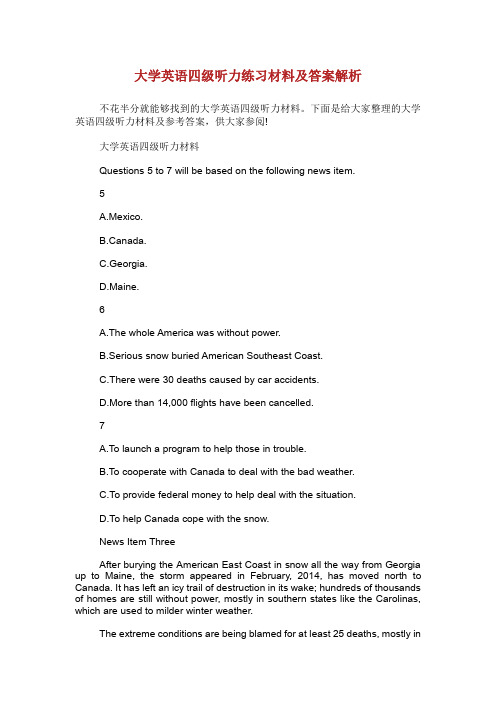
大学英语四级听力练习材料及答案解析不花半分就能够找到的大学英语四级听力材料。
下面是给大家整理的大学英语四级听力材料及参考答案,供大家参阅!大学英语四级听力材料Questions 5 to 7 will be based on the following news item.5A.Mexico.B.Canada.C.Georgia.D.Maine.6A.The whole America was without power.B.Serious snow buried American Southeast Coast.C.There were 30 deaths caused by car accidents.D.More than 14,000 flights have been cancelled.7A.To launch a program to help those in trouble.B.To cooperate with Canada to deal with the bad weather.C.To provide federal money to help deal with the situation.D.To help Canada cope with the snow.News Item ThreeAfter burying the American East Coast in snow all the way from Georgia up to Maine, the storm appeared in February, 2014, has moved north to Canada. It has left an icy trail of destruction in its wake; hundreds of thousands of homes are still without power, mostly in southern states like the Carolinas, which are used to milder winter weather.The extreme conditions are being blamed for at least 25 deaths, mostly intraffic accidents on roads that are slick with ice. Thirty people were injured in a multi-car pileup in Pennsylvania and more than 14,000 flights have been cancelled this week so far.President Obama has left the snow in Washington for the West Coast, where he has been talking about a very different type of extreme weather; California is in the midst of its worst drought in a hundred years. He promised federal money to help deal with what he called a very challenging situation .5.Where did the storm move according to the news?6.What did the storm result in?7.What did President Obama promise to do?短篇新闻(三)2014年2月开始的这场暴风雪沿美国东海岸将佐治亚到缅因州之间覆盖成一片冰天雪地之后,又移向了北方的加拿大。
(完整版)九年级英语听力材料及答案

九年级英语听力材料及答案A) 听下面10段对话,每段对话后都有一小题,听完每段对话后你都有10秒钟的时间回答有关小题和阅读下一小题,.每段对话读两遍.1.M: Does your headmaster come to school by bus or by bike every day?W: I think neither. Her home is only five minutes’walk from her office.2. M: When is the next flight for Sydney?W: 3:00.So there are still 45 minutes left.3. W: What’s that in your hand ,Andy?It looks like a little cat.M: No, it’s not a cat, but a hat.It’s a present from my mother.4. M: After the film is over, I’m going to my office.I’ve got some work to d o.W: OK, Jack. I’m going home.5. W: Are Harry and Carl older than you, John?M: Harry is, but Carl is a little younger than me.6 W: Writing home?M: Yes, to my parents.7. W: How do you find the book? Is it interesting?M: Yes, I’ve known much about the way the pop stars live.8. M: Jane, you won’t be able to get to the airport in time to catch the 10:00 flight.W: I realize that now, I’ll have to get my ticket changed.9. W: Excuse me, Mr Hill. May I ask you a few questions?M: Yes, of course. But I’m s orry I have a class at ten, why not call me during my office hours? That’s 4:00 to 5:00 p.m.on Monday, Thursday and Friday.10. M: It’s already ten.We’re going to miss the train.W: Relax, It leaves in about an hour, We’ve got plenty of time.B) 听下面两段对话和一段独白,听完第一段对话后回答11-13小题; 听完第二段对话后回答14-16小题, 听完独白后回答17-20小题。
模拟英语听力及答案
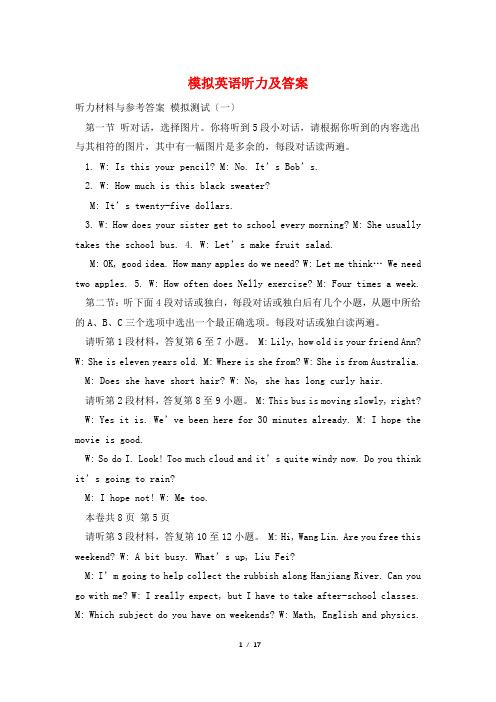
模拟英语听力及答案听力材料与参考答案模拟测试〔一〕第一节听对话,选择图片。
你将听到5段小对话,请根据你听到的内容选出与其相符的图片,其中有一幅图片是多余的,每段对话读两遍。
1. W: Is this your pencil? M: No. It’s Bob’s.2. W: How much is this black sweater?M: It’s twenty-five dollars.3. W: How does your sister get to school every morning? M: She usually takes the school bus.4. W: Let’s make fruit salad.M: OK, good idea. How many apples do we need? W: Let me think… We need two apples. 5. W: How often does Nelly exercise? M: Four times a week. 第二节:听下面4段对话或独白,每段对话或独白后有几个小题,从题中所给的A、B、C三个选项中选出一个最正确选项。
每段对话或独白读两遍。
请听第1段材料,答复第6至7小题。
M: Lily, how old is your friend Ann? W: She is eleven years old. M: Where is she from? W: She is from Australia. M: Does she have short hair? W: No, she has long curly hair.请听第2段材料,答复第8至9小题。
M: This bus is moving slowly, right? W: Yes it is. We’ve been here for 30 minutes already. M: I hope the movie is good.W: So do I. Look! Too much cloud and it’s quite windy now. Do you think it’s going to rain?M: I hope not! W: Me too.本卷共8页第5页请听第3段材料,答复第10至12小题。
八年级英语听力材料及参考答案
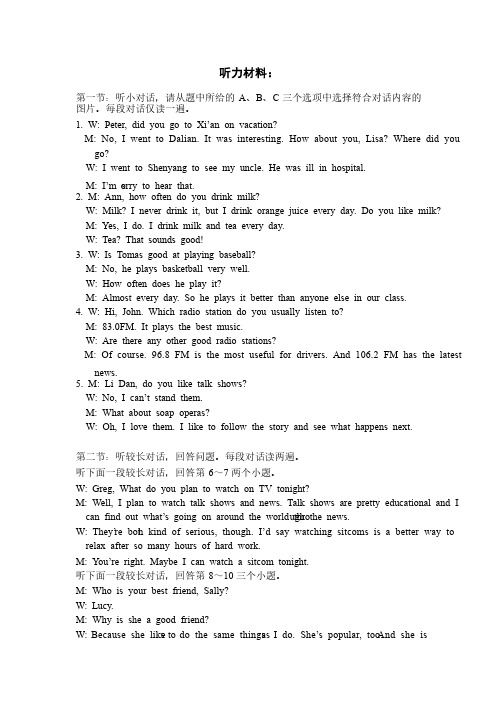
听力材料:第一节:听小对话,请从题中所给的A 、B 、C 三个选项中选择符合对话内容的图片。
每段对话仅读一遍。
图片。
每段对话仅读一遍。
1. W: Peter, did you go to Xi’an on vacation?M: No, I went to Dalian. It was interesting. How about you, Lisa? Where did you go? W: I went to Shenyang to see my uncle. He was ill in hospital. M: I’m s o rry to hear that. orry to hear that. 2. M: Ann, how often do you drink milk? W: Milk? I never drink it, but I drink orange juice every day. Do you like milk? M: Yes, I do. I drink milk and tea every day. W: Tea? That sounds good! 3. W: Is Tomas good at playing baseball? M: No, he plays basketball very well. W: How often does he play it? M: Almost every day. So he plays it better than anyone else in our class. 4. W: Hi, John. Which radio station do you usually listen to? M: 83.0FM. It plays the best music. W: Are there any other good radio stations? M: Of course. 96.8 FM is the most useful for drivers. And 106.2 FM has the latest news. 5. M: Li Dan, do you like talk shows? W: No, I can’t stand them.M: What about soap operas? W: Oh, I love them. I like to follow the story and see what happens next. 第二节:听较长对话,回答问题。
英语听力材料 英语听力材料原文(5篇)

英语听力材料英语听力材料原文(5篇)听力在高考试卷中占的比分是五分之一,其比分之大使得考生不敢对其有半点的马虎。
为了让您对于英语听力材料的写作了解的更为全面,下面作者给大家分享了5篇英语听力材料原文,希望可以给予您一定的参考与启发。
英语听力材料原文篇一In America, people are faced with more and more decisions every day, whether it’s picking one of 31 ice cream (1) , or deciding whether and when to get married. That sounds like a great thing, but as a recent study has shown, too many choices can make us (2) , unhappy, even paralyzed with indecision. ‘That’s (3) true when it comes to the work place’, says Barry Schwartz, an (4) of six books about human behavior. Students are graduating with a (5) of skills and interests, but often find themselves (6) when it comes to choosing an ultimate career goal. In a study, Schwartz observed decision-making among college students during their (7) year.flavors confused particularly author variety overwhelmed senior.在美国,人们每天都在面临越来越多的选择。
小学英语听力材料及参考答案

五年级听力材料及参考答案听力材料:一、听录音,选择你所听到的单词。
(每小题读两遍。
10分)1.night2.lift3. really4.past5.quarter6.lie7.puppet8.ten to six9.have breakfast 10.give orders二、听录音,选择正确的应答。
(每小题读两遍。
10分)1.What's this?2.Are you ready for class?3.Shall we go to the playground?4.Do you like collecting stamps?5.What does Mike usually do on Sundays?三、听录音,完成下列句子,每空一词。
(每小题读三遍。
10分)1. Put your hands on your head, please.2. Touch your toes with your fingers.3. Classes begin at half past eight.4. Breakfast is ready. Come and have some bread.5. He is busy from seven in the morning to ten at night.参考答案:一、听录音,选择你所听到的单词。
(每小题读两遍。
10分)AABBA ACCAC二、听录音,选择正确的应答。
(每小题读两遍。
10分)CCBBC三、听录音,完成下列句子,每空一词。
(每小题读三遍。
10分)1. Put hands2. toes with3. begin past4. Ready bread5. busy night四、判断下列单词画线部分读音是否相同,相同的用“√”表示,不相同的用“×”表示(6分)×××√××五、翻译下列词组(12分)1.at night2.站成一排3.jump up and down4.打扫图书馆5.six thirty/half past six6.值日7.his feet 8.刷牙 9.turn left and right10.把你的双脚并拢 11.really busy 12.发号施令六、用所给词的适当形式填空(11分)1.are singing2. to have,go3.get,gets4.teaches5.likes6.doesn't ,like7.to read ,well七、选择正确的答案,将其序号填入括号内(10分)BCBBB AABCB八、连词成句(10分)1.There's no time for rest.2.Do you want to join us?3.There's a football game at a quarter to five.4.The students are trying to follow the orders.5.Can you put the egg on your finger?九、句型转换(11分)1.What time2.like to3.goes school4.Don't lie5.What's the time十、阅读理解。
初中英语听力训练材料与答案
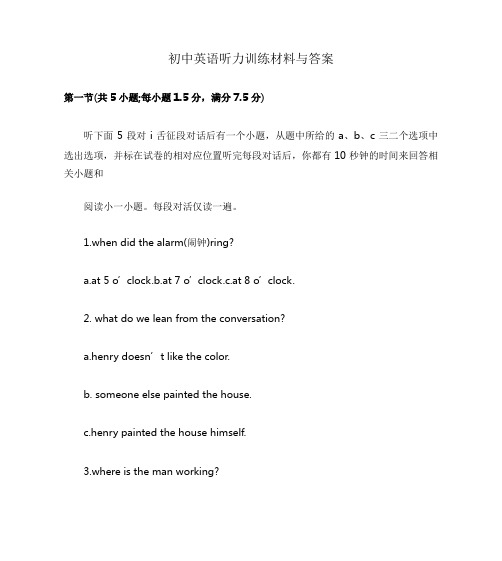
初中英语听力训练材料与答案第一节(共5小题;每小题1.5分,满分7.5分)听下面5段对i舌征段对话后有一个小题,从题中所给的a、b、c三二个选项中选出选项,并标在试卷的相对应位置听完每段对话后,你都有10秒钟的时间来回答相关小题和阅读小一小题。
每段对活仅读一遍。
1.when did the alarm(闹钟)ring?a.at 5 o’clock.b.at 7 o’clock.c.at 8 o’clock.2. what do we lean from the conversation?a.henry doesn’t like the color.b. someone else painted the house.c.henry painted the house himself.3.where is the man working?a.in a beer shop.b. in a bus station.c. in a restaurant.4.what does the woman mean?a.they don’t have many tickets.b.it is bard for them to get any tickets.c.all the tickets are sold out.5.how will the couple get home?a.they will walk home.b.they will take a taxi.c.they will take the subway(地铁).第二节(共15小题;每小题1.5分,满分22.5分)听下面五段对话或独白每段对话或独白后有儿个小题,从每题所给的a,b,c只个选项中选出选项,并标在试卷的相对应位置。
听每段对话或独白前,你将有时间阅读各个小题,每小题5秒钟;听完后,各小题将给出5秒钟的作答时间:。
每段对话或独白读两遍。
听第6段材料,回答第6至7题。
英语试题听力及答案

英语试题听力及答案一、听力理解(共20分)听下面对话或独白,根据所听内容,选择最佳答案。
(一)对话理解(每题2分,共10分)1. A: What's the weather like today?B: It's quite sunny but a bit windy.A: Shall we go for a picnic?B: I'd rather stay at home and watch a movie.Question: What does B prefer to do?A. Go for a picnic.B. Watch a movie.C. Do nothing.2. A: Have you finished your homework?B: Not yet. I need to do some reading first.A: How much time do you think you'll need?B: About an hour.Question: What is B going to do?A. Finish the homework.B. Do some reading.C. Take a break.(略去其他对话题目)(二)短文理解(每题2分,共10分)1. You will hear a short passage about a new shopping mall. The passage mentions that the mall has a food court, acinema, and several clothing stores.Question: What facilities does the new shopping mall have?A. A food court and a cinema.B. A cinema and several clothing stores.C. A food court, a cinema, and several clothing stores.2. Listen to the following story about a student who won a scholarship.The student worked hard and participated in various activities, which impressed the judges.Question: Why did the student win the scholarship?A. Because of good grades.B. Because of hard work and participation in activities.C. Because of recommendations from teachers.(略去其他短文题目)二、听力填空(共10分)Listen to the following dialogue and fill in the blanks with the appropriate words.A: Hi, I'm new in town. Can you tell me where the ________ is? B: Sure, it's just across the street from the ________.(略去其他填空题目)三、听力简答(共10分)Listen to the following conversation and answer the questions briefly.1. A: What time does the library open in the morning?B: It opens at 9:00 a.m.Question: At what time does the library open?2. A: How much is the ticket for the concert?B: It's 50 dollars.Question: What is the price of the concert ticket?(略去其他简答题)四、听力长对话(共10分)Listen to the following conversation and choose the best answer to each question.A: I heard you're going on a trip next week.B: Yes, I'm really looking forward to it. I've always wanted to visit that place.Question 1: What is B looking forward to?A. Visiting a new place.B. Going on a trip.C. Looking forward to something.Question 2: What is the relationship between A and B?A. Friends.B. Colleagues.C. Strangers.(略去其他长对话题目)听力答案:一、(一)1. B 2. B (略去其他答案)(二)1. C 2. B (略去其他答案)二、(略去填空答案)三、1. 9:00 a.m. 2. 50 dollars (略去其他答案)四、1. B 2. A (略去其他答案)。
九年级英语听力材料及答案
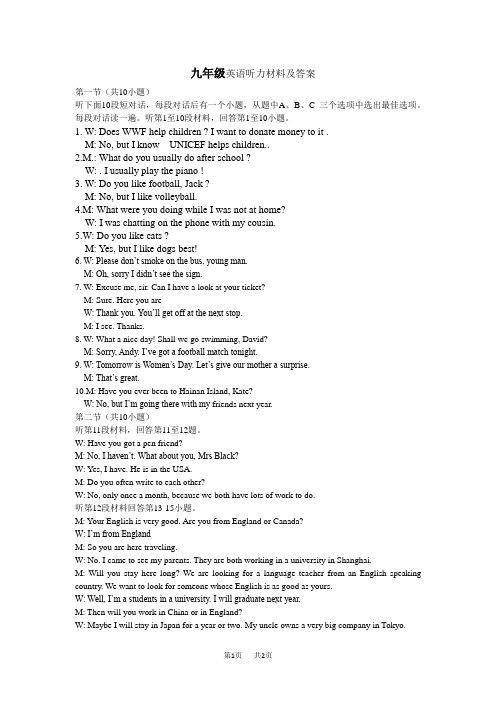
九年级英语听力材料及答案第一节(共10小题)听下面10段短对话,每段对话后有一个小题,从题中A、B、C 三个选项中选出最佳选项。
每段对话读一遍。
听第1至10段材料,回答第1至10小题。
1. W: Does WWF help children ? I want to donate money to it .M: No, but I know UNICEF helps children..2.M.: What do you usually do after school ?W: . I usually play the piano !3. W: Do you like football, Jack ?M: No, but I like volleyball.4.M: What were you doing while I was not at home?W: I was chatting on the phone with my cousin.5.W: Do you like cats ?M: Yes, but I like dogs best!6. W: Please don’t smoke on the bus, young man.M: Oh, sorry I didn’t see the sign.7. W: Excuse me, sir. Can I have a look at your ticket?M: Sure. Here you areW: Thank you. You’ll get off at the next stop.M: I see. Thanks.8. W: What a nice day! Shall we go swimming, David?M: Sorry, Andy. I’ve got a football match tonight.9. W: Tomorrow is Women’s Day. Let’s give our mother a surprise.M: That’s great.10.M: Have you ever been to Hainan Island, Kate?W: No, but I’m going there with my friends next year.第二节(共10小题)听第11段材料,回答第11至12题。
九年级英语听力材料及参考答案
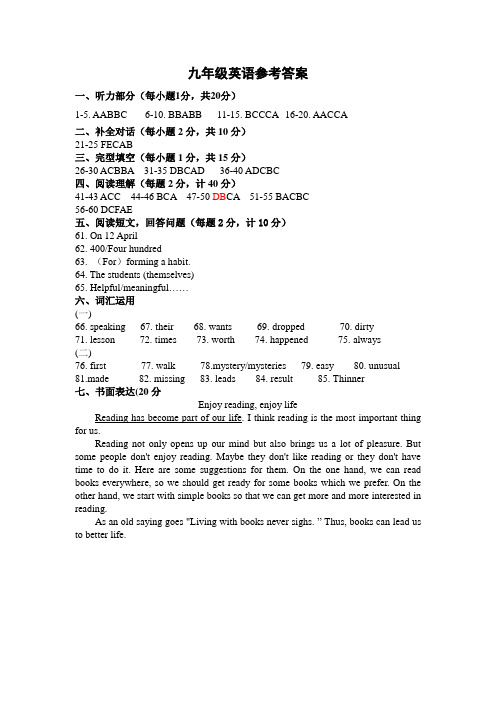
九年级英语参考答案一、听力部分(每小题1分,共20分)1-5. AABBC 6-10. BBABB 11-15. BCCCA 16-20. AACCA二、补全对话(每小题2分,共10分)21-25 FECAB三、完型填空(每小题1分,共15分)26-30 ACBBA 31-35 DBCAD 36-40 ADCBC四、阅读理解(每题2分,计40分)41-43 ACC 44-46 BCA 47-50 DB CA 51-55 BACBC56-60 DCFAE五、阅读短文,回答问题(每题2分,计10分)61. On 12 April62. 400/Four hundred63. (For)forming a habit.64. The students (themselves)65. Helpful/meaningful……六、词汇运用(一)66. speaking 67. their 68. wants 69. dropped 70. dirty71. lesson 72. times 73. worth 74. happened 75. always(二)76. first 77. walk 78.mystery/mysteries 79. easy 80. unusual81.made 82. missing 83. leads 84. result 85. Thinner七、书面表达(20分Enjoy reading, enjoy lifeReading has become part of our life. I think reading is the most important thing for us.Reading not only opens up our mind but also brings us a lot of pleasure. But some people don't enjoy reading. Maybe they don't like reading or they don't have time to do it. Here are some suggestions for them. On the one hand, we can read books everywhere, so we should get ready for some books which we prefer. On the other hand, we start with simple books so that we can get more and more interested in reading.As an old saying goes "Living with books never sighs. ” Thus, books can lead us to better life.听力材料一.听对话回答问题(计10分)1. W: Could I have some beef noodles, please?M: Beef noodles. OK.2. M: Excuse me, where's Sunshine Library?W: Turn left, walk straight ahead and you'll see it.3. M: Jane, don't forget to take your umbrella to school today.W:I've already got it here. Thanks, Dad.4. W: What are some good things and bad things about camping, Peter? M: I like hiking, but I don't like plants!5. W: David, I think we should go swimming today.M: I'm too tired. Let's just watch TV.6. W: Sam, Suzy and I are planning a barbecue. Would you like to come,Frank?M: OK. What can I bring? How about some paper plates?7. W: I just saw a beautiful diamond necklace at the jewellery shop. M: It might cost lots of money. Look around more.8. M: We'll have a concert next week. I'm practicing singing these days.What about you, Amy?W: I'm practising the violin all day.9. W: Millie and Susan are arguing again.M: Yes. Millie has lost Susan's new book.10. M: Mary, I'm an outgoing person. How can I get a better job?W: Try to be more patient and modest. Otherwise, they may choose someone else.二.听对话和短文回答问题(计10分)听第一段对话,回答第11、12小题。
初三年级英语练习听力材料及答案

初三年级英语练习听力材料及答案第一部分听对话回答问题,读两遍。
1.M:Do you know the girl in red?W:Yes, she is my sister, Mary. She was born in the Year of the Rat. She is clever and smart.2.M: I really want to be a basketball player. And you?W: Oh, I’m going to be a policewoman when I grow up.3.M: What a sunny day last Saturday!W: Yes, and we all had a great time in the park!4. M: I don’t like cats, they are lazy and they always sleep in the day.W: But they are working while we are sleeping at night.5.M: We’ll take an e xam tomorrow. I have to to stay up late to get ready for it tonight.W: You’d better go to bed early so you can stay awake in the exam.6.M: Excuse me. What’s the time by your watch?W: It’s half past five. But my watch is five minutes fast.7. M: Open your mouth. Now show me where it hurts.W: Here on the right, especially when I eat something cold or hot.8. M: How did your sister do in her exam, Rose?W: She is a top student and she came first.9. M: What kind of drink do you prefer, milk or coffee?W: Neither. I’d like a cup of tea.10. W: My parents help me with my study at home every day.M: You’re lucky. My parents are too busy to help me. So I often ask my friends for help if I have problems.第二部分听对话和短文回答问题,听两遍。
小学英语听力材料及参考答案
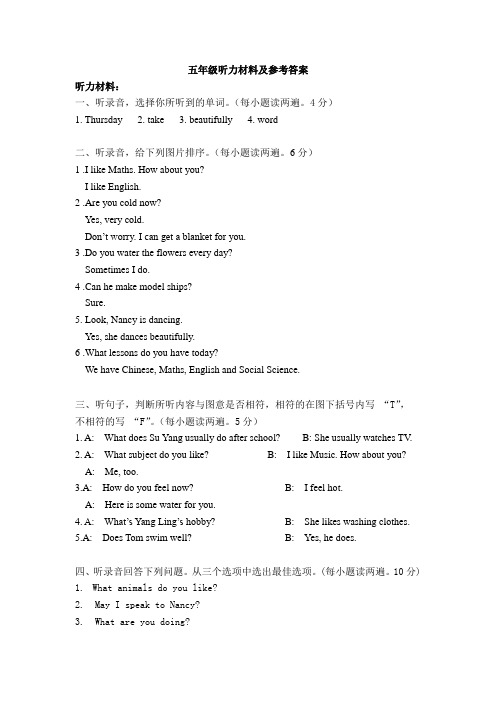
五年级听力材料及参考答案听力材料:一、听录音,选择你所听到的单词。
(每小题读两遍。
4分)1. Thursday2. take3. beautifully4. word二、听录音,给下列图片排序。
(每小题读两遍。
6分)1 .I like Maths. How about you?I like English.2 .Are you cold now?Yes, very cold.Don’t worry. I can get a blanket for you.3 .Do you water the flowers every day?Sometimes I do.4 .Can he make model ships?Sure.5. Look, Nancy is dancing.Yes, she dances beautifully.6 .What lessons do you have today?We have Chinese, Maths, English and Social Science.三、听句子,判断所听内容与图意是否相符,相符的在图下括号内写“T”,不相符的写“F”。
(每小题读两遍。
5分)1. A: What does Su Yang usually do after school? B: She usually watches TV.2. A: What subject do you like? B: I like Music. How about you? A: Me, too.3.A: How do you feel now? B: I feel hot.A: Here is some water for you.4. A: What’s Yang Ling’s hobby? B: She likes washing clothes.5.A: Does Tom swim well? B: Yes, he does.四、听录音回答下列问题。
大学英语四级听力材料及参考答案
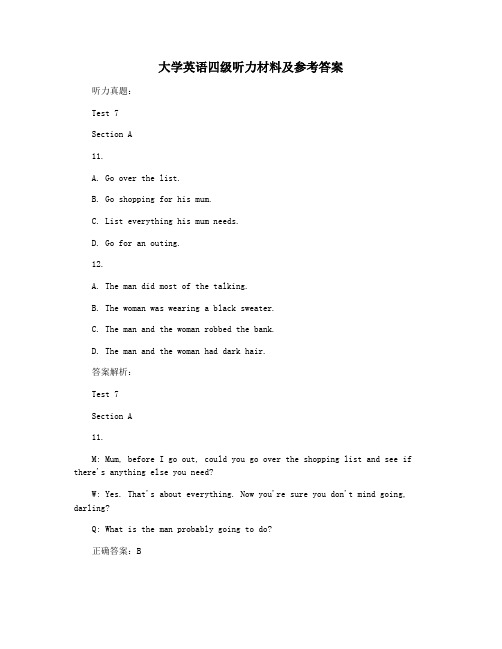
大学英语四级听力材料及参考答案听力真题:Test 7Section A11.A. Go over the list.B. Go shopping for his mum.C. List everything his mum needs.D. Go for an outing.12.A. The man did most of the talking.B. The woman was wearing a black sweater.C. The man and the woman robbed the bank.D. The man and the woman had dark hair.答案解析:Test 7Section A11.M: Mum, before I go out, could you go over the shopping list and see if there's anything else you need?W: Yes. That's about everything. Now you're sure you don't mind going, darling?Q: What is the man probably going to do?正确答案:B解析:男士说:“妈,在我出门前,请你再看一遍购物单,看有没有什么别的东西要买?”可见男士是要为母亲购物,故B正确。
12.M: Could you describe the two people who robbed the bank?W: Well, the man was tall with dark hair and he was wearing a black sweater. The main thing that I remembered about the woman was that she did most of the talking.Q: What do we learn about the two people described in the conversation?正确答案:C解析:男士问:“你能说说抢银行的那两个人长什么样吗?”可见C正确。
高一英语听力材料及参考答案
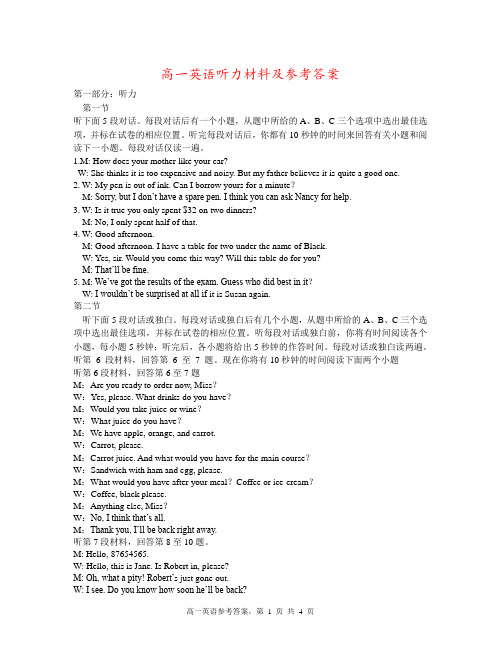
高一英语听力材料及参考答案第一部分:听力第一节听下面5段对话。
每段对话后有一个小题,从题中所给的A、B、C三个选项中选出最佳选项,并标在试卷的相应位置。
听完每段对话后,你都有10秒钟的时间来回答有关小题和阅读下一小题。
每段对话仅读一遍。
1.M: How does your mother like your car?W: She thinks it is too expensive and noisy. But my father believes it is quite a good one.2. W: My pen is out of ink. Can I borrow yours for a minute?M: Sorry, but I don’t have a spare pen. I think you can ask Nancy for help.3. W: Is it true you only spent $32 on two dinners?M: No, I only spent half of that.4. W: Good afternoon.M: Good afternoon. I have a table for two under the name of Black.W: Yes, sir. Would you come this way? Will this table do for you?M: That’ll be fine.5. M: We’ve got the results of the exam. Guess who did best in it?W: I wouldn’t be surprised at all if it is Susan again.第二节听下面5段对话或独白。
每段对话或独白后有几个小题,从题中所给的A、B、C三个选项中选出最佳选项,并标在试卷的相应位置。
(完整版)九年级英语听力材料及答案
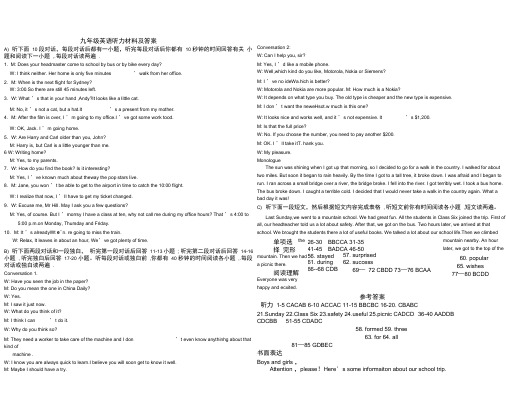
九年级英语听力材料及答案A) 听下面10 段对话,每段对话后都有一小题,听完每段对话后你都有10 秒钟的时间回答有关小题和阅读下一小题,.每段对话读两遍.1. M: Does your headmaster come to school by bus or by bike every day?W: I think neither. Her home is only five minutes ' walk from her office.2. M: When is the next flight for Sydney?W: 3:00.So there are still 45 minutes left.3. W: What ' s that in your hand ,Andy?It looks like a little cat.M: No, it ' s not a cat, but a hat.It ' s a present from my mother.4. M: After the film is over, I ' m going to my office.I ' ve got some work tood.W: OK, Jack. I ' m going home.5. W: Are Harry and Carl older than you, John?M: Harry is, but Carl is a little younger than me.6 W: Writing home?M: Yes, to my parents.7. W: How do you find the book? Is it interesting?M: Yes, I ' ve known much about theway the pop stars live.8. M: Jane, you won ' t be able to get to the airport in time to catch the 10:00 flight.W: I realize that now, I ' ll have to get my ticket changed.9. W: Excuse me, Mr Hill. May I ask you a few questions?M: Yes, of course. But I ' morrsy I have a class at ten, why not call me during my office hours? That ' s 4:00 to 5:00 p.m.on Monday, Thursday and Friday.10. M: It ' s alreadyWt e'n. re going to miss the train.W: Relax, It leaves in about an hour, We' ve got plenty of time.B) 听下面两段对话和一段独白,听完第一段对话后回答11-13小题; 听完第二段对话后回答14-16 小题, 听完独白后回答17-20 小题。
人教版九年级英语听力材料及答案

初中英语学习资料madeofjingetiejiUnits 11~ 14 听力资料一、依据你听到的对话,选择正确的答案回答下列问题。
据你听到的对话,选择正确的答案回答下列问题。
听下边 5 段对话,每听完一段对话后,做 1 个小题。
1.W: Don ’tforget to turn off the lights when you leave, Jim.M:OK, Lily.2.M: Hi, Anna. What ’s school club are you in this term?W:I ’m in the chess club.3.M: Lily, what makes you angry?W:When some people throw rubbish around, I feel very angry.4.M: Do you have a pet?W:Yes, I have a yellow cat with a pink nose.5.M: Where do you have lunch on school days ? At home?W:No, I live far from the school, so I have lunch in the school dinning hall.听第六段对话,做第6-7 小题。
W:Hey, Mike. Why don ’tyou get on that bus. It ’s empty.M:I ’m not going home right now. I ’m going to visit my cousin from Jinan.W:Your cousin.M:Yes. Her family just moved here last week.W:Which bus are you going to take?M: The No. 61 or No. 816 bus. Her house is next to the People ’s Hospital.听第七段对话,做第8-9 小题。
高三英语听力材料及参考答案
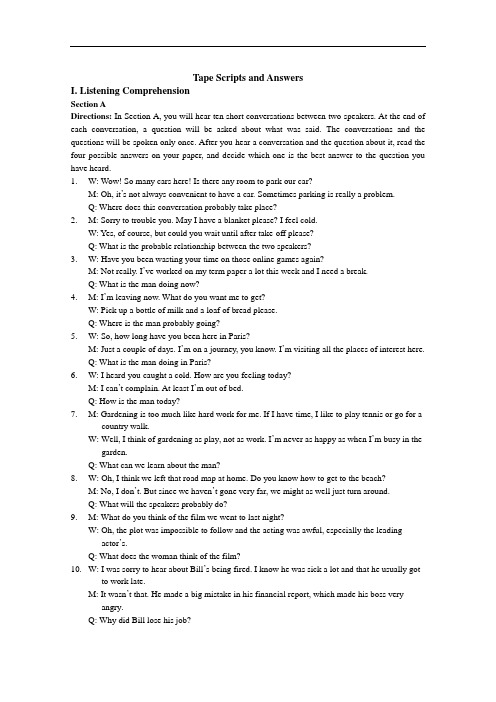
Tape Scripts and AnswersI. Listening ComprehensionSection ADirections: In Section A, you will hear ten short conversations between two speakers. At the end of each conversation, a question will be asked about what was said. The conversations and the questions will be spoken only once. After you hear a conversation and the question about it, read the four possible answers on your paper, and decide which one is the best answer to the question you have heard.1. W: Wow! So many cars here! Is there any room to park our car?M: Oh, it’s not always convenient to have a car. Sometimes parking is really a problem.Q: Where does this conversation probably take place?2. M: Sorry to trouble you. May I have a blanket please? I feel cold.W: Yes, of course, but could you wait until after take-off please?Q: What is the probable relationship between the two speakers?3. W: Have you been wasting your time on those online games again?M: Not really. I’ve worked on my term paper a lot this week and I need a break.Q: What is the man doing now?4. M: I’m leaving now. What do you want me to get?W: Pick up a bottle of milk and a loaf of bread please.Q: Where is the man probably going?5. W: So, how long have you been here in Paris?M: Just a couple of days. I’m on a journey, you know. I’m visiting all the places of interest here.Q: What is the man doing in Paris?6. W: I heard you caught a cold. How are you feeling today?M: I can’t complain. At least I’m out of bed.Q: How is the man today?7. M: Gardening is too much like hard work for me. If I have time, I like to play tennis or go for acountry walk.W: Well, I think of gardening as play, not as work. I’m never as happy as when I’m busy in the garden.Q: What can we learn about the man?8. W: Oh, I think we left that road map at home. Do you know how to get to the beach?M: No, I don’t. But since we haven’t gone very far, we might as well just turn around.Q: What will the speakers probably do?9. M: What do you think of the film we went to last night?W: Oh, the plot was impossible to follow and the acting was awful, especially the leading actor’s.Q: What does the woman think of the film?10. W: I was sorry to hear about Bill’s being fired. I know he was sick a lot and that he usually gotto work late.M: It wasn’t that. He made a big mistake in his financial report, which made his boss very angry.Q: Why did Bill lose his job?Section BDirections: In Section B, you will hear two short passages, and you will be asked three questions on each of the passages. The passages will be read twice, but the questions will be spoken only once. When you hear a question, read the four possible answers on your paper and decide which one would be the best answer to the question you have heard.Questions 11 through 13 are based on the following passage.The variety of food is Britain’s greatest attraction. Nearly every country in the world is represented, and some of the best Indian and Chinese restaurants in the world can be found in cities such as London, Liverpool, Manchester and many others. Fast food restaurants serving pizzas, hamburgers, fish and chips are very convenient for visitors who just want something quick. They usually stay open all day, and welcome children, unlike some restaurants whose main customers are business people.Prices have to be displayed outside restaurants. Set price menus, common in some of the best restaurants at lunchtime, offer good value for money.Most pubs also serve food, especially at lunchtime. This can be cold food such as bread, cheese and salad, or simple hot dished such as chicken and chips. Apart from beer, wine is also available and many pubs now also serve coffee. Wine bars also offer a relaxing atmosphere in which to enjoy a good meal. There are many different wines, and the food is usually more complicated than in pubs. (Now listen again, please.)Questions:11. What is great about the food in Britain?12. Where do the restaurants have to display their prices?13. What drink in pubs is not mentioned?Questions 14 through 16 are based on the following passage.Nowadays, how to make a good newspaper story has aroused people’s great interest. Undoubtedly, it is no easy thing. First – obviously – it must be new. But since TV can react to events so quickly, this is often a problem for newspapers. They usually respond to it in one of three ways. Newspapers will provide extra detail, comment or background information. Above all, they will try to find a new angle on the day’s major stories. In addition, they may print completely different stories which TV doesn’t broadcast.What else? Well – it also has to be dramatic and often involves some kind of conflict or danger. This is one reason why so much news seems to be bad news. “Plane lands safely –no-one hurt”doesn’t sell newspapers. “Plane crash – 200 feared dead!” does.Next, there’s human interest. People are interested in other people –particularly in the rich, famous and powerful. Stories about the private lives of pop singers, actors, models, politicians, for example, all appear regularly in certain newspapers.Finally, for many editors, familiarity is an important factor, too. They prefer stories about people, places and events which their readers know. That’s why the stories in Tokyo’s newspapers are often very different from the stories printed in Paris or New York.(Now listen again, please.)14. Compared with TV’s quick reaction to events, what’s the most important response ofnewspapers?15. Why do stories about famous people appear frequently in certain newspapers?16. What is the passage mainly about?Section CDirections:In Section C, you will hear two longer conversations. The conversations will be read twice. After you hear each conversation, you are required to fill in the numbered blanks with the information you have heard. Write your answers on your answer sheet.Blanks 17 through 20 are based on the following conversation.W: Hello, NEC Computers. May I help you?M: Yes, this is Jake Green from champion Office supplies. May I speak to Ms Wang, please?W: I’m sorry, but she is not in right now. May I take a message?M: Yes. Ms Wang sent me your newest line of laptop computers with a description of other software products, but there wasn’t any information about after-sales service.W: Oh, I’m sorry. I’ll remind her to fax that to you as soon as possible.M: That’ll be fine. Could you tell her to fax the information around 2:30 this afternoon? That would give me time to look over the material before I report to my boss, say, around 4:00 p.m.W: OK. May I have your telephone number and fax number please?M: Sure. The phone number is 560-1827. The fax number is 560-3631.W: All right. I will tell Ms Wang when she comes back.M: Thank you. Bye.(Now listen again, please)Complete the form. Write ONE WORD for each answer.Blanks 21 through 24 are based on the following conversation.M: Susan, what’s that in your hand?W: Come on, Don. Haven’t you seen a cigarette before? Every day in the United States, about 1500 girls begin smoking, and I figured, why not do my share?M: But don’t you know that tobacco kills more than 140,000 women each year.W: Yeah, but that’s why I smoke light cigarettes.M: But do you know that smoking a light cigarette is just as risky as smoking a regular one?W: I didn’t know that.M: The one thing you can say about tobacco companies is that they are really smart about marketing. Tobacco commercials for men focus on cigarettes as cool, while tobacco commercials for women focus on social and political themes. For example, ads will say that you’ve come a long way, or that you’ve found your voice, or encourage you to just be yourself, as if smoking has anything to do with progress and self-expression.W: So, Don, can you pass me that ashtray?M: With pleasure, Susan, as long as you put it out.(Now listen again,please)Complete the form. Write NO MORE THAN THREE WORDS for each answer.(That’s the end of the listening.) 听力部分到此结束,请同学们继续答题。
- 1、下载文档前请自行甄别文档内容的完整性,平台不提供额外的编辑、内容补充、找答案等附加服务。
- 2、"仅部分预览"的文档,不可在线预览部分如存在完整性等问题,可反馈申请退款(可完整预览的文档不适用该条件!)。
- 3、如文档侵犯您的权益,请联系客服反馈,我们会尽快为您处理(人工客服工作时间:9:00-18:30)。
南通市2011—2012学年度第一次调研测试参考答案英语参考答案:1—5 CBBCA 6—10 BCBAC 11—15 CABAA 16—20 CCABA21—25 BDACD 26—30 ADACB 31—35 CCBDB36—40 BADBA 41—45 CDCAD 46—50 BCADA 51—55 CBCBD56—60 DBBCA 61—65 DACBB 66—70 ACBAD71. speaking / talking 72. important / vital / significant 73. how 74. choose75. positive 76. influence / impact / effect 77. rid78. enables / allows / helps 79. humor 80. WorkingOne possible version:V olunteer spirit is rooted in the hearts of many people, especially young people in China. In recent years, there have been large numbers of volunteers devoting their time and effort to people in need.The picture shows us a touching moment when two volunteers help a disabled man in a wheelchair. Realizing it would be impossible for the man to get to the top all by himself, the volunteers carry the wheelchair with difficulty step by step up the stairs.This picture reminds me of many volunteers in my school, my community and our country, helping not just the disabled, but also those who can’t find their way around, or those who suffer from misfortune. V olunteers make a difference to these people when they bring them warmth, comfort and relief.I would be happy to be a volunteer, too, and help the senior citizens in the House for the Aged regularly so that they will not feel lonely but enjoy their life to the full.听力材料:Text 1W: Bob, you are reading this book? I thought you disliked it.M: Yes, it’s full of strange ideas with common photos, but it provides some technical data that might be useful in my study.Text 2W: Come on. Plenty of room here. Fares, please!M: Two to the beach. How much is it?W: Three dollars.Text 3W: Excuse me! I don’t have time to waste. I’ve been here almost one full hour!M: Sorry, madam. You have to wait your turn. There’s no place for parking now.Text 4W: Bill, your work is too messy.M: I’ll pay attention to my handwriting next time.W: Is this a promise?M: Yes, I’m serious this time.Text 5W: Oh, dear! I t’s eight flights up!M: That’s all right.We’ll get used to it. After all, w e’re a little further away from the street and traffic noise and there’s no one living over us.Text 6W: I’m having a hard time getting the information for my report.M: Tha t’s easy. You only have to sea rch the Internet to get what you want.W: Really? But how?M: So click here, then up to the top. Then open that window. Yeah, that one.W: Er...Hum...Got it.M: And that’s it. You’re done.W: I see. That is pretty easy after all. Now I can get what I need in my room!Text 7W: Sir, may I please see your license? Do you know how fast you were going?M: No, I’m not sure. I think about 65 m iles per hour, right?W: You’re not sure? You were going at 90 miles per hour! That’s 25 miles per hour over the legal speed limit! How can you explain your behavior?M: Well, I was using a cell phone. While I did that I was listening to music, and eating some food. W: I’ll have to give you a ticket. Be more careful next time.Text 8M: What are you reading about in that science magazine?W: There are several interesting articles in it. I’ve just finished reading one about cloning.M: I don’t like the idea of that. I don’t want people to copy me or any other people. It could be very confusing.W: According to the article, you have no real need to worry. Research nowadays is focusing on cloning parts of a human body to replace damaged or lost parts, not on recreating a whole human being.M: If so, we can benefit from it.W: In this article, scientists say that if you took the genes from someone and tried to create a copy of a person, there’s no guarantee that the copy would look or act like the original!M: Really? What else have you discovered?W: I read about how scientists are using material from plants and animals to create new medicines. M: That’s great, because it uses natural materials rather than ones that scientists make themselves.I prefer natural medicines to man-made ones.Text 9W: Let’s have seafood tonight and then go see the new movie at Mall Cinema. I t’s a beautiful love story.M: Oh, goodness, please not again. That’s what we did last week.W: No, we didn’st week we went to see that movie about a man’s struggle against illness. M: Right, that was intended for women, just like this one. Besides, this is the last week for Rush Hour. And action movies like that need to be seen in a theatre on a big screen.W: Oh, yeah, I did promise to see it with you. But you liked that movie, didn’t you?M: Oh, sure, it was great. I had popcorn for dinner and paid the price of a movie ticket to get a two-hour sleep.W: It wasn’t that bad and we went to an excellent restaurant.M: That place doesn’t have a single meat dish.Just fish and you know I don’t like fish that much. W: And I don’t like meat that much. The only meat I eat is chicken.M: But when I pick the restaurant, I always respect your food preferences.W: Well, I suppose that, to be fair, you should get to pick the movie and we can go to a restaurant that serves meat.Text 10Hi, everyone! I’d like to talk about healthy diets in this period. First of all, why should we eat healthy? Eating a healthy diet is important for long-lasting energy and illness prevention. Learning how to eat healthier and what it really means to do so will help you lose weight and feel great. It also helps you realize that no matter how busy your life is, you can take the time to have good meals and snacks throughout the day.The importance of a healthy diet used to be just about having enough food to eat. In earlier times, this usually meant growing your own food and raising pigs, sheep or cows to feed your family. There were no such things as artificial colorings or flavorings or even so much worry about the different types of fats and what sugar calories can do to your weight.The main problem with many diets today is that they are based on cutting out whole food groups to lose weight. It is true, for example, that if you cut your body off from carbs like potatoes and rice, you may lose pounds quicker but you are not really eating healthfully. By cutting out certain aspects of food, you are not giving your body what it needs to stay well. Eating right, having a balanced diet instead of eating the same things all the time is still the best way to lose weight safely without any bad effects to your body. Dieting is merely eating less and sometimes not getting the nutrients you need to stay in good health.南通市2011—2012学年度高三第一次调研测试英语试卷评分说明任务型阅读:第80题答案Working的首字母必须大写,写成小写不给分。
